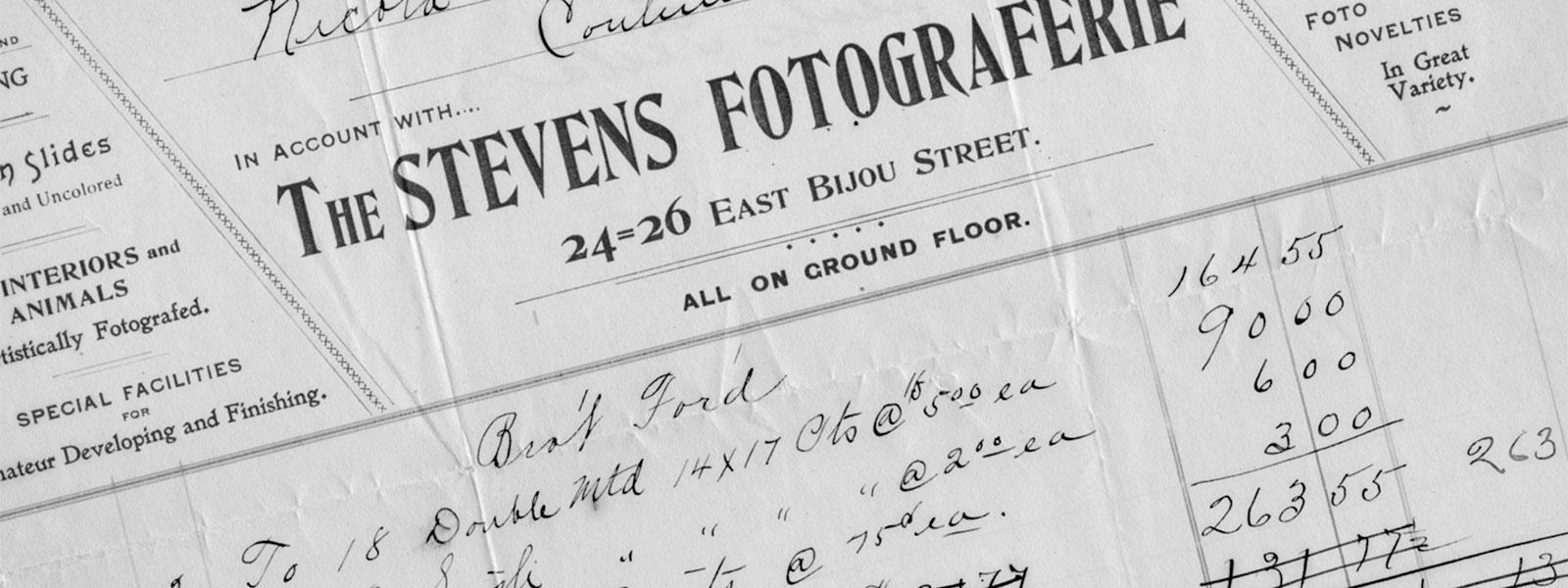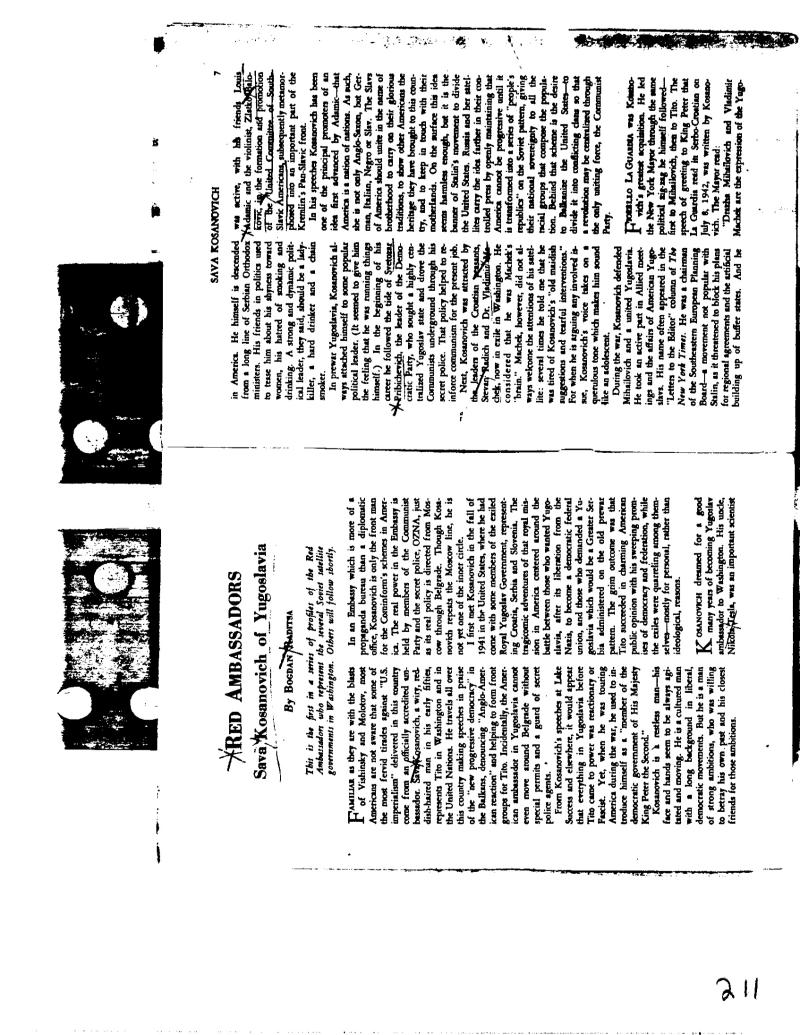
Nikola Tesla Documents
Nikola Tesla FBI Files - Page 211
211 RED AMBASSADORS Sava, Kosanovich_of_Yugoslavia By BOGDAN ADITYA This is the first in a series of profiles of the Red Ambassadors who represent the several Soviet satellite governments in Washington. Others will follow shortly. Pamiliar as they are with the blasts Molotov, most Americans are not aware that some of the most fervid tirades against "U.S. imperialistn" delivered in this country come from an officially accredited umbassador. Sava Kosanovich, a wiry, red. dish-haired man in his early fifties, represents Tito in Washington and in the United Nations. He travels all over this country making speeches in praise of the "new progressive democracy" in the Balkans, denouncing "Anglo-American reaction" and helping to form front groups for Tito. Incidentally, the Amer. ican ambassador in Yugoslavia cannot even move around Belgrade without special permits and a guard of secret police agents. U From Kosanovich's speeches at Lake Success and elsewhere, it would appear that everything in Yugoslavia before Tito came to power was reactionary or Fascist. Yet, when he was touring America during the war, he used to in troduce himself as a "member of the democratic government of His Majesty King Peter the Second." Kosanovich is à restless man-his face and hands seem to be always agitated and moving. He is a cultured man with a long background in liberal, democratic movements. But he is a man of strong ambitions, who was willing to betray his own. past and his closest friends for those ambitions. In an Embassy which is more of a propaganda bureau than a diplomatic office, Kosanovich is only the front man for the Cominform's schemes in America. The real power in the Embassy is held by members of the Communist Party and the secret police, OZNA, just as its real policy is directed from Moscow through Belgrade. Though Kosanovich repeats the Moscow line, he is not yet one of the inner circle. I first met Kosanovich in the fall of 1941 in the United States, where he had come with some members of the exiled Royal Yugoslav Government, representing Croatia, Serbia and Slovenia. The tragicomic adventures of that royal mission in America centered around the battle between those who wanted Yugoslavia, after its liberation from the Nazis, to become a democratic federal union, and those who demanded a Yugoslavia which would be a Greater Serbia administered on the old prewar pattern. The grim outcome was that Tito succeeded in charming American public opinion with his sweeping promises of democracy and federation, while the exiles were quarreling among themselves mostly for personal, rather than ideological, reasons. K OSANOVICH dreamed for a good many years of becoming Yugoslav ambassador to Washington. His uncle, Nikola Tesla, was an important scientist SAVA KOSANOVICH in America. He himself is descended from a long line of Serbian Orthodox ministers. His friends in politics used to tease him about his shyness toward women, his hatred of smoking and drinking. A strong and dynamic political leader, they said, should be a ladykiller, a hard drinker and a chain smoker. In prewar Yugoslavia, Kosanovich always attached himself to some popular political leader. (It seemed to give him the feeling that he was running things himself.) In the beginning of his career he followed the tide of Svetozar, Pribichevich, the leader of the Democratic Party, who sought a highly centralized Yugoslav state and drove the Communists underground through his secret police. That policy helped to reinforce communism for the present job. Next, Kosanovich was attracted by the leaders of the Croatian peasants, Stevan Radich and Dr. Vladimir e chek, now in exile in Washington. He considered that he was Machek's 'brain." Machek, however, did not always welcome the attentions of his satellite: several times he told me that he was tired of Kosanovich's "old maidish suggestions and tearful interventions." For when he is arguing any involved is sue, Kosanovich's voice takes on a querulous tone which makes him sound like an adolescent. During the war, Kosanovich defended Mihailovich and a united Yugoslavia. He took an active part in Allied meetings and the affairs of American Yugoslavs. His name often appeared in the "Letters to the Editor" column of The New York Times. He was a chairman of the Southeastern European Planning Board movement not popular with Stalin, as it threatened to block his plans for regional agreements and the artificial building up of buffer states. And be 34 7 was active, with h friends Louis Adamic and the violinist, Zlatko Balokovi, in the formation and promotion of the United Committee of South Slavic Americans, subsequently metamorphosed into an important part of the Kremlin's Pan-Slavic front. In his speeches Kosanovich has been one of the principal promoters of an idea first advanced by Adamic-that America is a nation of nations. As such, she is not only Anglo-Saxon, but German, Italian, Negro or Slav. The Slavs of America should unite in the name of brotherhood to carry on their glorious traditions, to show other Americans the heritage they have brought this country, and to keep in touch with their motherlands. On the surface this idea seems harmless enough, but it is the banner of Stalin's movement to divide the United States. Russia and her satellites carry the idea farther in their controlled press by openly maintaining that America cannot be progressive until it is transformed into a series of "people's republics" on the Soviet pattern, giving their national sovereignty to all the racial groups that compose the population. Behind that scheme is the desire to Balkanize the United States to divide it into conflicting clans so that a revolution may be centralized through the only uniting force, the Communist Party. FOR MORELLO LA Guardia was Kosthovich's greatest acquisition. He led the New York Mayor through the same political zig-zag he himself followedfirst to Mihailovich, then to Tito. The speech of greeting to King Peter that La Guardia read in Serbo-Croatian on July 8, 1942, was written by Kosano vich. The Mayor read: "Drazha Mihailovich and Vladimir Machek are the expression of the Yugo
